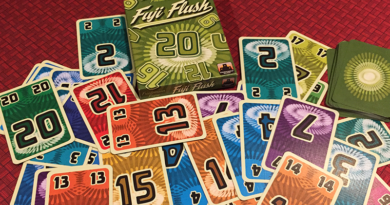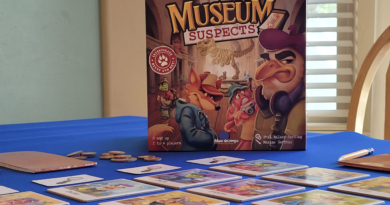Abandon All Artichokes Card Game Review
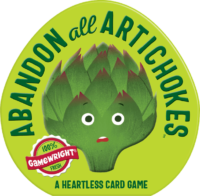
When you give your kids vegetables for dinner, do they just push them around and try to make it look like they ate some?
Or do you have to tell them to stop playing with their food?
Well, now there’s a new way to play with vegetables — Abandon All Artichokes!
Gamewright is known for making fantastic board games and card games for families and we’re happy to say that tradition continues with this light, fun family card game.
How to play Abandon All Artichokes
Abandon All Artichokes is a light card game with a clear goal and simple rules.
Players each start with a personal deck of 10 Artichoke cards that they’re trying to get rid of. They do so by getting other vegetables that give them special powers — such as ditching those pesky artichokes.
To begin, each player gets a starting deck of 10 Artichoke cards and draws 5 to their hand. All the other vegetable cards (10 different types) are shuffled together and placed face down to create a Garden Stack. The top 5 cards from the Garden Stack are then placed face up to form the Garden Row.
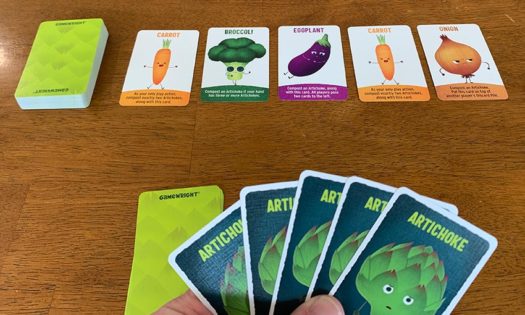
On a player’s turn, they do the following:
- Replenish: Add cards from the Garden Stack to the Garden Row until there are 5 cards there.
- Harvest: Take one of the face up cards in the Garden Row and add it to their hand.
- Play: Players can play any number of cards from their hand as they want to. But they must be able to fulfill all things the card says. Once played, the card goes to the player’s personal discard pile (unless the card says otherwise). If something is “Composted”, it goes to the main Compost Pile (out of the game) not the player’s discard pile. Players can only play an Artichoke card if another card tells them to.
- Discard: The player places all un-played (or un-playable) cards in their hand to their personal discard pile.
- Draw: The player draws 5 cards from their deck to their hand. If their deck runs out before getting to 5, they shuffle their discard pile to form a new deck and continue drawing up to 5.
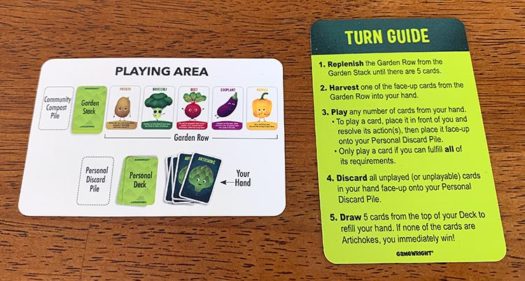
When a player refills their hand to 5 cards at the end of their turn and it doesn’t contain any Artichokes, that player immediately wins the game!
And that’s all there is to playing the game. Simple, right?
Ok — there’s a little more to it than that. Because the fun of the game really revolves around the powers of all the other 10 vegetables!
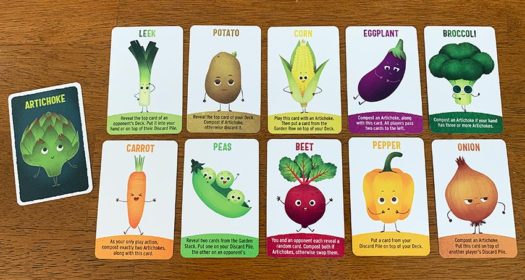
Beet: Pick an opponent and each reveal a random card from the other player’s hand. If they’re both artichokes, both players Compost them. Otherwise, swap those cards with each other.
Broccoli: Compost an Artichoke if your hand has 3 or more Artichokes.
Corn: Play the Corn card with an Artichoke card from your hand then put a card from the Garden Row on top of your deck.
Carrot: Compost exactly 2 Artichokes and the Carrot card.
Eggplant: Compost an Artichoke along with this card. Then all players simultaneously pass 2 cards of their choice to their left.
Leek: Reveal the top card of an opponents deck and choose to either put it in their discard pile or into your hand.
Onion: Compost an Artichoke then put the Onion card on an opponent’s discard pile.
Pepper: Put a card from your discard pile on top of your deck.
Peas: Reveal the top 2 cards from the Garden Stack. Put one on the top of your discard pile and the other on top of an opponent’s discard pile.
Potato: Reveal the top card of your deck. If it’s an Artichoke, compost it. If it’s any other vegetable, discard it.
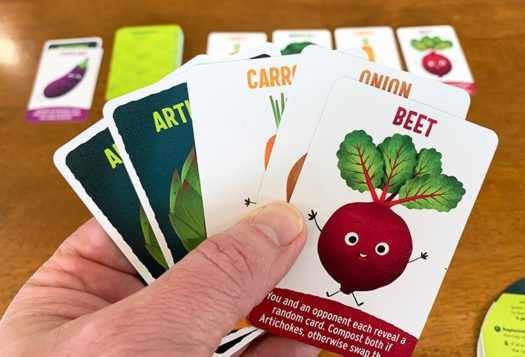
Can the whole family enjoy Abandon All Artichokes?
Abandon All Artichokes is a fun game for the whole family. The recommended age is 10+ but we know kids younger than this will enjoy the game too.
The vegetable cards each have their abilities written on them. So it helps if kids know how to read. But even if they don’t, they can learn the game and will soon remember the different abilities of the vegetables.
The catch is in recognizing how to take advantage of the different vegetable abilities. And that takes some thinking.
Of course, like many card games, there’s also a large amount of luck in the game.
But that’s also why we enjoy the game — because it’s light and silly.
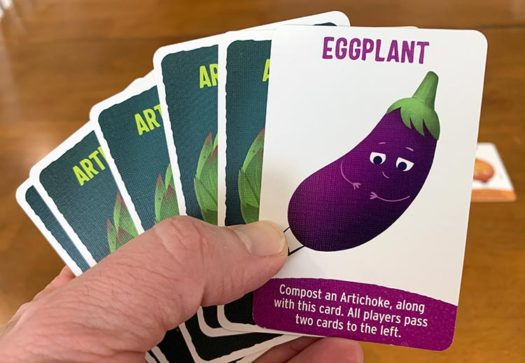
It’s fun trying to find ways to get rid of your Artichokes. And that comes down to which cards you take from the Garden Row and when you choose to use them.
The variety of vegetable powers creates a lot of fun choices.
Do you use them to get rid of Artichokes or keep them in your deck so your chance of drawing a full hand without artichokes increases?
Because some of the cards that let you get rid of artichokes also force you to burn off that vegetable card. And some of the cards may also benefit your opponents.
It’s this balance of luck and choices that keeps us coming back for more.
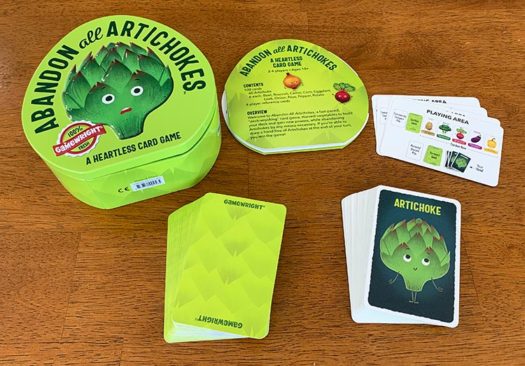
How does Abandon All Artichokes score on our “Let’s Play Again” game meter?
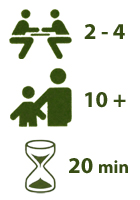 Abandon All Artichokes is such a simple and light game, yet still with enough variety, that it’s easy to play multiple games back to back.
Abandon All Artichokes is such a simple and light game, yet still with enough variety, that it’s easy to play multiple games back to back.
Once one game ends, just deal out artichoke cards again, shuffle the other vegetable cards together and you’re ready to go.
Plus, the artwork on the cards is super adorable. Who wouldn’t want to grab some of these vegetables and play again?
So if you’re looking for another light family card game, grab a copy of Abandon All Artichokes and start playing with your food for fun.
We’d like to thank Gamewright for a review copy of Abandon All Artichokes.



